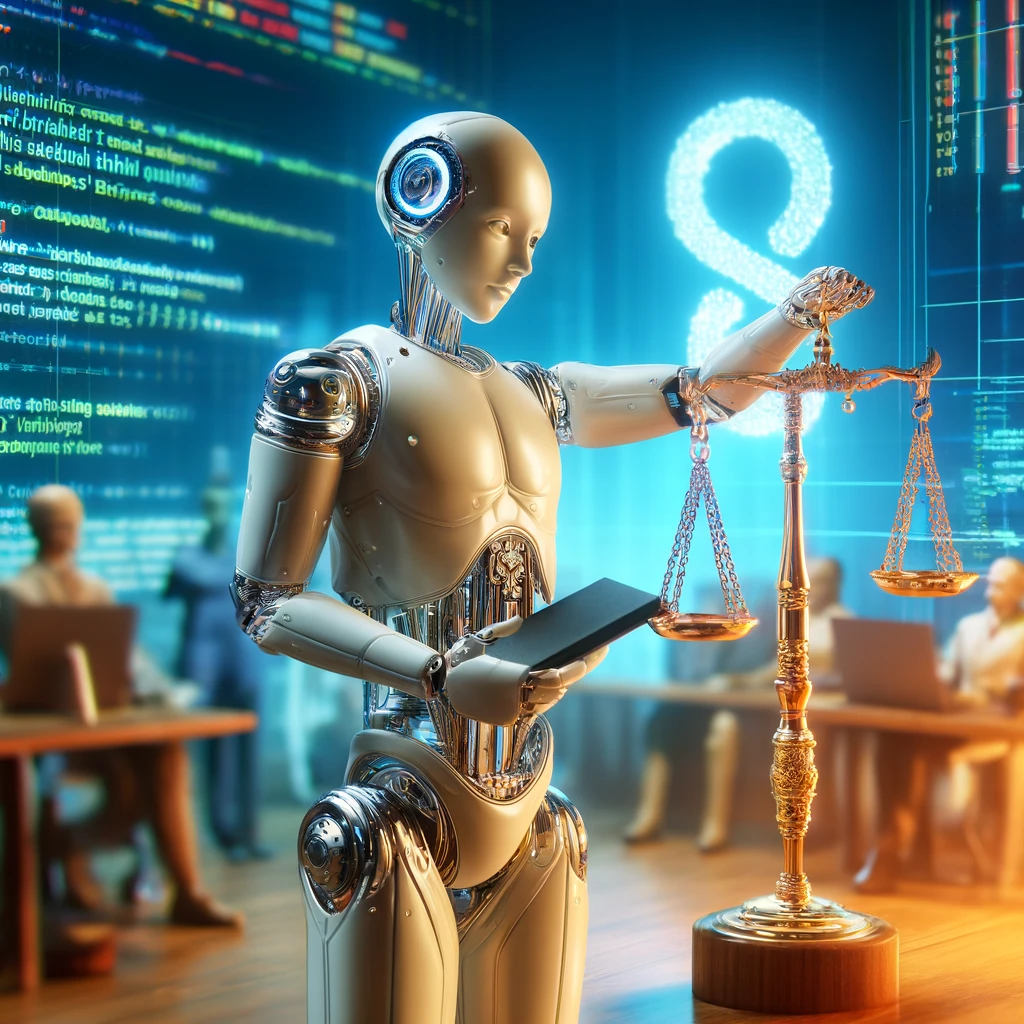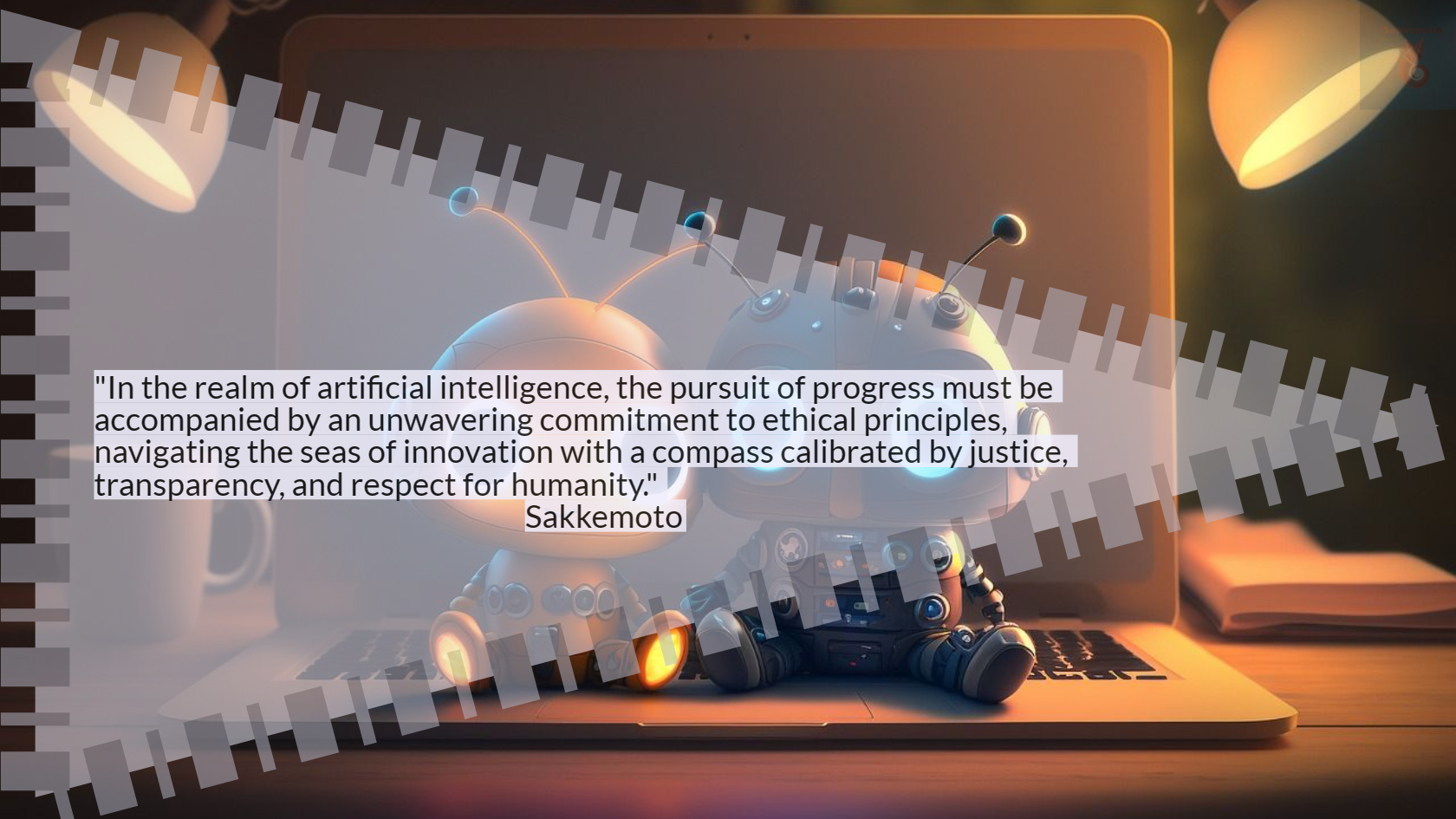Page Contents
- Artificial Intelligence (AI)
- The growing importance of ethical considerations in the AI era
- Understanding the ethical challenges posed by AI
- Artificial Intelligence (AI)
- Debates surrounding the use of AI in healthcare!
- Ethical considerations in the use of AI in autonomous vehicles!
- The impact of AI on job displacement and societal ethics!
- Balancing innovation and ethical responsibility in AI development!
- Artificial Intelligence (AI)
- Testimonials
- Conclusion: Artificial Intelligence (AI)
Artificial Intelligence (AI) is transforming industries across the globe, revolutionizing the way we live and work. From healthcare and finance to transportation and entertainment, AI has the potential to greatly improve efficiency and productivity. However, with this great power comes great responsibility.
Artificial Intelligence (AI)
As AI becomes more prevalent in our society, it raises increasing concerns about its ethical implications. We must address and tackle these ethical considerations and engage in meaningful debates to ensure developers and users deploy AI responsibly and ethically. This blog delves into the various ethical dilemmas AI presents across different sectors and offers insights on how we can navigate these challenges.
The growing importance of ethical considerations in the AI era
In the rapidly evolving world of artificial intelligence (AI), one thing is becoming increasingly clear:
ethical considerations cannot be ignored. As AI continues to permeate various sectors, its impact on society becomes more profound. From biased algorithms and invasion of privacy to job displacement and the potential for autonomous weapons, the ethical dilemmas surrounding AI are numerous and complex.

Addressing these concerns is not just a moral imperative; it is also crucial for the long-term success and acceptance of AI technologies. As the general public becomes more aware of the potential risks associated with AI, they demand transparency, accountability, and safeguards to protect their rights and values. Moreover, businesses and policymakers are recognizing the importance of ethical AI practices to maintain trust and avoid negative consequences.
In this blog, we will delve deeper into the ethical considerations that arise from the use of AI in various sectors, exploring the potential risks and benefits, and highlighting the need for responsible AI development and deployment. Join us as we navigate the challenging landscape of AI ethics and examine how we can shape the future of AI to align with our collective values.
Understanding the ethical challenges posed by AI
One of the primary ethical challenges posed by AI is the issue of biased algorithms. As AI systems train on large datasets, they can potentially perpetuate and amplify existing biases. For instance, a facial recognition system predominantly trained on images of white faces may encounter challenges in accurately recognizing individuals with darker skin tones.This can lead to discriminatory outcomes in areas such as law enforcement or hiring processes.
It is essential to understand these challenges to promote responsible AI development and deployment that align with our values and meet the needs of society as a whole.
Another ethical consideration is the invasion of privacy. AI technologies frequently collect and analyze extensive amounts of user data, prompting concerns about the utilization and accessibility of this information. Users may perceive a compromise to their privacy when AI algorithms extract personal information from social media or monitor their online activities.
Moreover, the impact of AI on the job market cannot be ignored. Automating tasks traditionally performed by humans can lead to job displacement and economic inequality. As AI continues to advance, it is crucial to consider how society can navigate the potential disruptions in the labor market and ensure a fair and just transition for workers.
Artificial Intelligence (AI)
In addition, the potential for autonomous weapons raises significant ethical questions. The development of AI-powered weaponry has the potential to remove human agency from life-and-death decisions, with potentially devastating consequences. The use of such weapons in warfare raises concerns about accountability and the potential for unintended harm.
These are just a few examples of the ethical challenges posed by AI. In the next section, we will explore some of these issues in more detail, examining the potential risks and consequences they entail. It is essential to understand these challenges to promote responsible AI development and deployment that align with our values and meet the needs of society as a whole. Stay tuned to gain a deeper insight into the ethical nuances of AI and how we can address them.
Debates surrounding the use of AI in healthcare!
Debates surrounding the use of AI in healthcare have become increasingly prominent as the technology continues to advance. On one hand, proponents argue that AI can greatly improve patient outcomes by enhancing diagnostic accuracy, improving treatment plans, and reducing medical errors. AI has the potential to analyze medical records and imaging data at a speed and accuracy that surpasses human capabilities, leading to quicker and more accurate diagnoses.
However, concerns have been raised regarding the ethical implications of relying heavily on AI in healthcare. One of the primary concerns is the potential for AI algorithms to make life-or-death decisions without human intervention. This raises questions about accountability and the acceptability of leaving critical decisions in the hands of machines.
Additionally, there are concerns about the unequal access to AI-driven healthcare. If AI technologies are primarily available only to those who can afford them, it could exacerbate existing healthcare disparities, leaving vulnerable populations further behind.

These debates highlight the need for careful consideration and regulation of AI in healthcare. Striking a balance between the potential benefits and potential risks is crucial to ensure that AI is used ethically and responsibly in the healthcare sector. In the next section, we will delve deeper into these debates and explore potential solutions to navigate these challenges. Stay tuned to learn more about the ethical considerations surrounding the use of AI in healthcare and how they impact patients and healthcare providers.
Ethical considerations in the use of AI in autonomous vehicles!
The ethical implications of using AI in the field of autonomous vehicles have sparked intense debates and discussions. On one hand, proponents argue that AI can greatly enhance road safety by reducing human errors, which are responsible for the majority of accidents. AI-powered autonomous vehicles have the potential to analyze traffic patterns, make split-second decisions, and react faster than humans, leading to a significant decrease in road accidents.
However, concerns have been raised regarding the ethical decisions that AI algorithms may have to make in certain scenarios. For example, in a situation where an accident is inevitable, the AI algorithm may need to choose between two equally unfavorable outcomes, such as running over a group of pedestrians or sacrificing the passenger’s life. These ethical dilemmas raise questions about the programming and decision-making processes behind AI systems.
Accountability is also a major concern in the realm of autonomous vehicles. Who should be held responsible in the event of an accident caused by an AI algorithm? Should it be the manufacturer, the programmer, or the owner of the vehicle? Resolving this issue is crucial to ensure fairness and justice in cases of accidents involving AI-driven autonomous vehicles.
Striking the right balance between safety, efficiency, and ethical considerations is a formidable challenge in the use of AI in autonomous vehicles. In the upcoming section, we will explore these ethical considerations in more depth and discuss potential solutions to address them. Stay tuned to learn more about the complex intersection of AI and ethics in the field of autonomous vehicles.
The impact of AI on job displacement and societal ethics!
The ethical implications of AI extend beyond the field of autonomous vehicles, particularly when it comes to job displacement and its impact on society. AI has the potential to automate various tasks and job roles, raising concerns about widespread unemployment and economic inequality.
While AI can improve efficiency and productivity in sectors such as manufacturing and customer service, it also poses a threat to jobs traditionally performed by humans. This has led to debates on the ethical responsibility of businesses implementing AI in terms of job retraining or providing alternative employment opportunities for affected workers.
Moreover, the societal ethics of AI adoption need careful consideration. AI algorithms are often trained on vast amounts of data, including historical biases and discriminatory patterns. If not properly addressed, this can result in AI systems perpetuating social inequalities and biases in decision-making processes, such as in hiring or loan approval.
Finding a balance between AI-driven efficiency and maintaining fairness and equality requires proactive steps by governments, organizations, and the AI community. Measures such as implementing transparent and accountable AI systems, addressing bias in data sets, and fostering collaboration between humans and AI can help mitigate the potential negative impacts on jobs and societal ethics.
In the next section, we will delve deeper into the ethical considerations surrounding job displacement and societal impacts of AI. Join us as we explore the ways in which businesses and policymakers can navigate this complex terrain and promote a more ethical use of AI.
Balancing innovation and ethical responsibility in AI development!
As the field of AI continues to advance rapidly, it becomes crucial for developers and businesses to strike a balance between pushing the boundaries of technology and recognizing their ethical responsibility. Job displacement remains one of the key ethical considerations in the use of AI. While AI-driven automation can lead to increased efficiency and reduced costs, it also poses risks to the livelihoods of workers.
To address this concern, businesses must proactively set up job retraining programs for employees whose roles AI may replace. Organizations ought to invest in initiatives for reskilling and upskilling to empower workers with the essential skills for adapting to the evolving job market. Furthermore, they should explore creating alternative employment opportunities to minimize the negative impact on individuals and communities.
Another significant ethical dimension surrounding AI is its societal impact. AI algorithms that are trained on biased or discriminatory data can perpetuate social inequalities and biases in decision-making processes. To mitigate these issues, organizations must prioritize addressing bias in data sets and ensuring that AI systems are transparent, accountable, and fair.
Artificial Intelligence (AI)
In addition to the responsibility of businesses, policymakers play a crucial role in shaping the ethical landscape of AI. Governments should establish clear regulations and guidelines for the development and deployment of AI systems. These regulations should address concerns such as data privacy, algorithmic transparency, and the ethical use of AI in sensitive areas like healthcare and criminal justice.

Collaboration between humans and AI is also essential in promoting ethical AI. Instead of viewing AI as a complete replacement for human workers, businesses should focus on integrating AI as a tool to augment human capabilities. This approach not only ensures a more ethical use of AI but also maximizes the potential for innovation and productivity.
But by striking a balance between innovation and ethical responsibility, businesses and policymakers can navigate the complex terrain of AI development. Ultimately, ensuring the equitable sharing of benefits from AI technology and mitigating potential negative impacts will require adopting an ethical approach.Join us in the next section as we explore specific strategies for businesses and policymakers to promote ethical AI practices.

Testimonials
- Dr. Ayesha K., AI Researcher “Implementing ethical AI practices within our research projects has not only enhanced the accuracy of our algorithms but also ensured they are fair and non-discriminatory. This approach has gained the trust of our partners and the public, proving that ethical responsibility can coincide with cutting-edge innovation.”
- Tom R., Healthcare Administrator “With the assistance of ethical AI, we’ve been able to drastically improve our patient care systems. The transparent use of AI in diagnosing and treatment planning has made our services more efficient and trusted by our patients.”
- Nina P., Tech Ethics Consultant “Working to develop guidelines for AI use in various industries has been challenging yet rewarding. Seeing companies adopt these guidelines and commit to ethical AI use is a testament to the potential for responsible technology deployment.”
Conclusion: Artificial Intelligence (AI)
In conclusion, as AI continues to evolve and permeate various sectors, it is imperative that we prioritize ethical considerations in its development and deployment. Balancing innovation with ethical responsibility requires a collaborative effort between businesses, policymakers, and society as a whole. By focusing on job retraining and creating alternative employment opportunities, organizations can minimize the adverse effects of job displacement.
Addressing bias in AI algorithms and ensuring transparency and accountability in decision-making processes are crucial steps to mitigate societal inequalities perpetuated by AI. Policymakers must establish clear regulations to protect data privacy, promote algorithmic transparency, and guide the ethical use of AI in sensitive areas.
Furthermore, viewing AI as a tool to augment human capabilities rather than replace them fosters a more ethical use of AI and maximizes its potential for innovation and productivity. It is through these measures that we can navigate the ethical landscape of AI and harness its benefits while safeguarding against its potential negative impacts.
Join us in the next section as we delve deeper into specific strategies for businesses and policymakers to promote and uphold ethical practices in the realm of AI. Together, we can ensure the responsible and ethical integration of AI in our society.
FAQ
- What are the main ethical challenges associated with AI? The primary ethical challenges include biased algorithms, invasion of privacy, job displacement, and the misuse of AI in creating autonomous weapons. Addressing these challenges is crucial to developing AI responsibly.
- How can businesses ensure their AI systems are ethical? Businesses can ensure their AI systems are ethical by integrating transparency, accountability, and fairness into their AI development process. This includes conducting audits for bias, ensuring data privacy, and maintaining clear oversight and accountability mechanisms.
- What role do policymakers have in regulating AI? Policymakers must establish clear regulations that address data privacy, transparency in AI decision-making, and ethical considerations in AI applications across different sectors. Their role is crucial in setting the standards for responsible AI use.
Last Word
As we delve deeper into the age of artificial intelligence, the importance of marrying innovation with ethical responsibility cannot be overstressed. Companies, policymakers, and the AI community must work collaboratively to address the ethical challenges posed by AI.

By doing so, we can harness the tremendous potential of AI to improve lives and industries while safeguarding fundamental human rights and societal values.So the path forward should be guided by robust ethical frameworks that ensure AI advancements are beneficial and just for all segments of society. Let’s continue this journey with a commitment to upholding the highest standards of ethics in AI.
ai ai security artificial intelligence ethics financial freedom future
Last modified: 19 April 2024









helloI like your writing very so much proportion we keep up a correspondence extra approximately your post on AOL I need an expert in this space to unravel my problem May be that is you Taking a look forward to see you
Hello! I’m glad you appreciate the writing on AI and Ethics.
I was recommended this website by my cousin I am not sure whether this post is written by him as nobody else know such detailed about my trouble You are amazing Thanks
Hello! I’m glad you found your way to this website and that you found the information about AI and ethics helpful. If you have any specific questions about AI, ethics, or any other topics you’d like to explore, feel free to let me know. While I don’t have specific information about who recommended the site, I’m here to provide assistance and information. Thank you for your kind words, and I’m here to help! 😊🤖🌐
I have read some excellent stuff here Definitely value bookmarking for revisiting I wonder how much effort you put to make the sort of excellent informative website
Hello Gianni Schiller! I’m pleased to hear that you’ve found the information on AI and ethics valuable.If you have any questions about AI, ethics, or if there’s anything else related to the topic that you’d like to explore, feel free to let me know. I’m here to provide information and support. Thank you for your positive feedback! 😊
Digital Strategy NJ
Thank you I have just been searching for information approximately this topic for a while and yours is the best I have found out so far However what in regards to the bottom line Are you certain concerning the supply
I used to be able to find good info from your content.
Thank you, Muhammad! I’m glad you’ve found the content on AI and ethics informative and useful. It’s an important and constantly evolving area, with many ethical considerations and debates surrounding the development and application of AI technology. If you have any specific questions or topics within AI and ethics you’re interested in exploring further, feel free to let me know. Your feedback and curiosity drive the content to be as relevant and insightful as possible!
[…] These include the initial cost of implementation, the need for skilled personnel to manage AI systems, and concerns around data privacy and […]